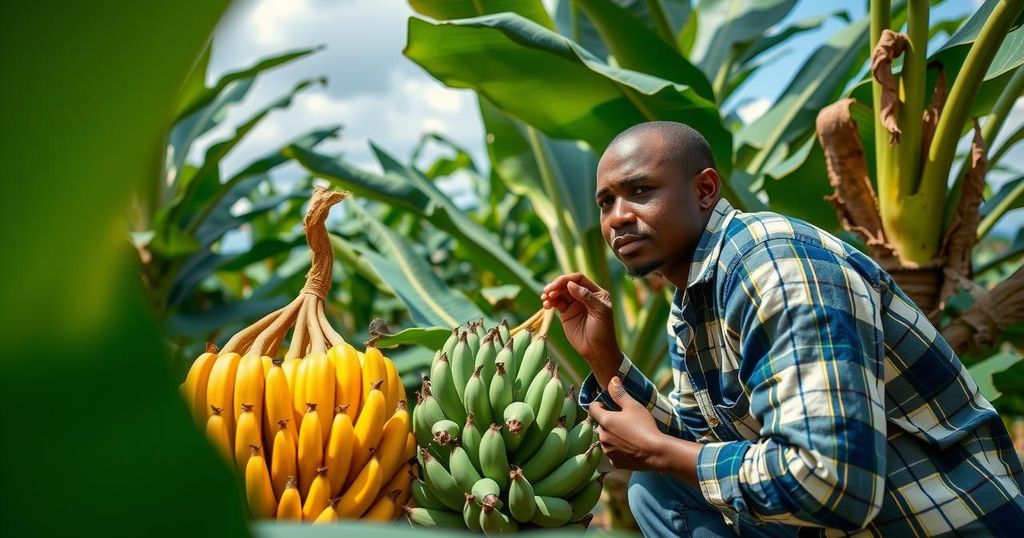Innovative Insurance Solutions for Uganda’s Vulnerable Banana Farmers

A novel insurance initiative in Uganda is aiding banana farmers in mitigating risks associated with extreme weather conditions resulting from climate change. By integrating digital technology into the insurance process and offering agricultural training, the program enhances farmers’ financial resilience and productivity. This initiative is set to expand its reach to 50,000 farmers, providing critical support to an essential sector of Uganda’s economy.
In Uganda, a novel insurance initiative is providing essential protection to banana farmers against extreme weather events exacerbated by climate change. For example, Ahumwire Justine, a farmer from Shuku, experienced significant losses when a severe rain and hailstorm devastated her crop and livestock. The event underscored the vulnerability of agricultural practices in light of increasing storm frequency and intensity, compelling families like Justine’s to reconsider their livelihood options due to financial distress from unprotected losses. Climate scientists have noted that Uganda’s weather has grown increasingly erratic over the past fifteen years, marked by unpredictable rains and droughts, which significantly endangers the agricultural sector. Recognizing the urgent need for support, the NDC Action Project, a collaboration between the United Nations Environment Programme (UNEP) and its Copenhagen Climate Centre, aims to equip vulnerable farmers with tools that enhance resilience against climatic uncertainty. According to Mirey Atallah, Chief of the Adaptation and Resilience Branch at UNEP, “We know farmers, particularly smallholders, are struggling to adapt to the effects of the climate crisis… projects that combine technical and financial instruments… are so important.” Bananas, a crucial crop for Uganda’s economy, account for the livelihood of nearly half of the farmer population. However, ongoing climatic challenges threaten their sustainability. The Banana Industrial Research and Development Centre, which supports approximately 5,000 farmers, facilitates the insurance project’s implementation by training farmers to utilize smartphones. This training enables them to report crop damage digitally, accelerating claims processing through remote evaluations by agroeconomists and minimizing costs. This innovative approach has demonstrated significant potential, as insurance connected to a digital platform allows for quicker payouts and lowers premiums, fostering financial security for farmers. Additionally, agricultural training in water management and agroforestry practices has resulted in increased productivity while simultaneously mitigating the risks associated with climate-related losses. The aforementioned initiative is set to expand, aiming to reach 50,000 banana farmers, thereby enhancing community resilience. For Justine, the insurance program brings much-needed reassurance, signifying that if crops are damaged, assistance will be available; contrasting the previous experience where she would have to restart her farming business from nothing.
The article highlights the implementation of an innovative insurance initiative designed to protect Ugandan banana farmers from the impacts of climate change, particularly extreme weather events that threaten agricultural stability. Due to increasing unpredictability in weather patterns, farmers are increasingly vulnerable to crop and livestock losses, which not only affect their income but also their overall livelihood. The ongoing collaboration between UNEP and the Banana Industrial Research and Development Centre represents a strategic effort to mitigate the risks faced by farmers through technical training and the integration of digital technology into insurance claims processes.
The initiative to provide insurance to banana farmers in Uganda marks a significant advancement in agricultural resilience against climate change. Through a combination of education, technology, and financial support, farmers are better equipped to withstand extreme weather events, ultimately contributing to their economic security and empowering them to maintain their livelihoods. The expansion of this program promises to benefit an even larger community of farmers, fostering a sustainable agricultural environment in Uganda amid growing environmental challenges.
Original Source: www.unenvironment.org






